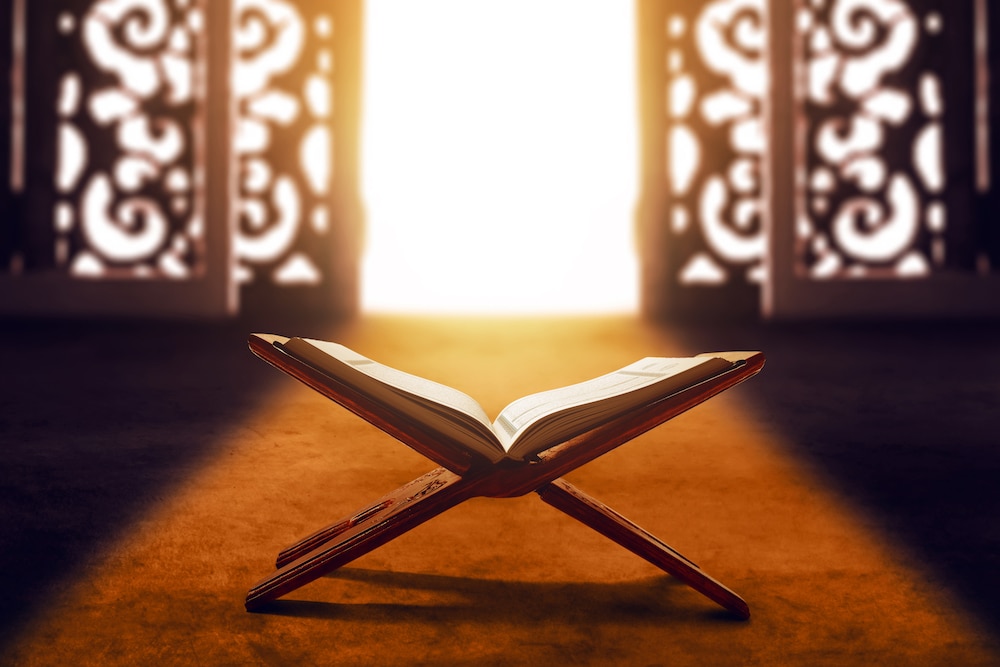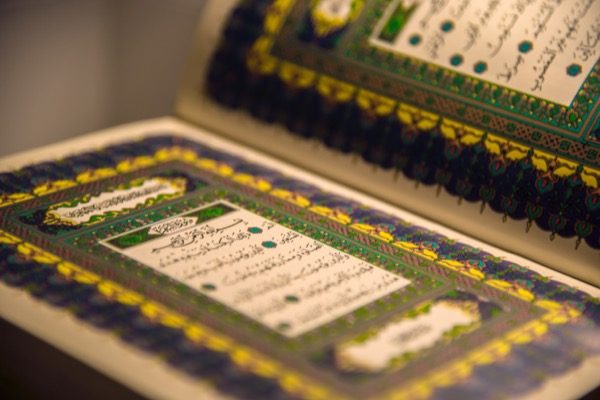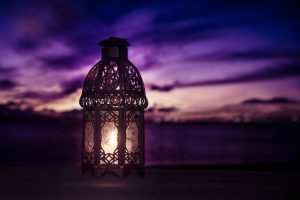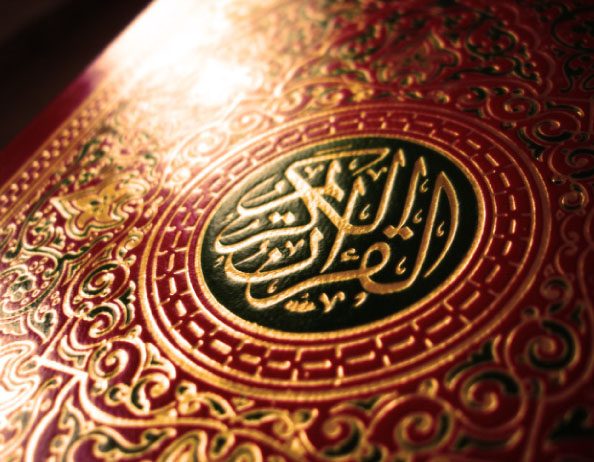
© Shutterstock
In the previous edition, we took a look at the meaning of the verse, ‘From the evil of that which He has created.’
In this edition, we examine the various aspects of creation mentioned in the opening verses of Sūrah al-Falaq.
Translated by Murtaza Ahmad
Edited by The Review of Religions Translation Team.
In addition, قُلْ أَعُوذُ بِرَبِّ الْفَلَقِ * مِنْ شَرِّ مَا خَلَقَ also indicates that man is one constituent part of all creation. That is to say, after putting all the minerals, plants, and animals together in the world, God Almighty created man, and man is rooted in all three places/sources. Man emerges as the essence of all three. If he does not draw his diet from these three sources, man ceases to exist. For instance, grapes are not composed of soil but they do grow out of the soil; if you uproot them from that soil, the grapes will no longer grow, because it is through the soil and the stem that they flourish. Without the soil, the grapes cannot survive and without the grapes the soil would be of no value.
Similarly, had it not been the case that man was the essence of plants, minerals and animals, and these resources had not [produced man], they would have all been useless and worthless. For instance, soil is useless when it does not yield melons, or when it doesn’t produce mangoes and grapes. Hence, those who think that God Almighty wishes to elevate man spiritually by depriving him from Ṭayyibāt [material things that are good, pure, lawful and wholesome] and by prohibiting him from fulfilling his innate needs, ignore the fact that Ṭayyibāt are the soil in which the plant of spirituality grows, and the soil in which it flourishes and bears spiritual fruit. Thus, this is what Islam teaches. Islam declares that man is the fruit of the essence which comes from the mixing together of plants, minerals and animals. Without them, the tree of humanity cannot thrive. And until we keep in mind that mankind’s roots are found in all these three sources – minerals, plants and animals – the tree of humanity cannot bloom. In the verses of Sūrah al-Falaq قُلْ أَعُوذُ بِرَبِّ الْفَلَقِ * مِنْ شَرِّ مَا خَلَقَ our attention is drawn to this very fact: that man is one part of creation. He is not independent and separate from minerals, plants and animals. If man were independent from them he would not have been instructed to seek protection against their evil. Clearly, the words مِنْ شَرِّ مَا خَلَقَ warn us that these things can harm us; and that we should pray at all times to be safeguarded against their evil. We are told here that all minerals can both benefit us and harm us; all plants can both benefit us and harm us; all animals can both benefit us and harm us. And that our roots are embedded in all three of these components. Thus, we are taught to pray that if we seek progress then we should care for our mineral-, plant- and animal-based body. Until the roots are watered, the tree cannot flourish. In the same way, a person cannot reach a higher level of spirituality until he uses what is Ṭayyib [pure and wholesome] from among the minerals, plants and animals and avoids their evil properties. Similarly, some diseases of a tree are caused by its roots and some from its leaves. These verses of Sūrah al-Falaq teach us the remedy for the diseases that may afflict us from our roots. In short, we have been commanded here to seek refuge with He Who is the Creator of all creation so that we can enjoy the benefits of all of creation while also being protected from its evils, and this can only happen with the will of the One Who created these components – otherwise it would be impossible.
In the words قُلْ أَعُوذُ بِرَبِّ الْفَلَقِ * مِنْ شَرِّ مَا خَلَقَ God Almighty draws attention every member of the Muslim Ummah [community] to another important point, which is that in the chapter preceding Sūrah al-Falaq – that is, Sūrah al-Ikhlāṣ – Allah Almighty has taught us a lesson regarding the perfect and absolute oneness of God. This chapter is then followed by the declaration قُلْ أَعُوذُ بِرَبِّ الْفَلَقِ * مِنْ شَرِّ مَا خَلَقَ wherein God states, ‘O you who believe in Me, My Word and My Qur’ān! Go and proclaim your faith among the people and say: أَعُوذُ بِرَبِّ الْفَلَقِ * مِنْ شَرِّ مَا خَلَقَ. In other words, it means, ‘O people! You put your trust in the world, you put your trust in your parents; you put your trust in your relatives and friends; you put your trust in your families and tribes; you put your trust in the people of your neighbourhood; your local leaders; you put your trust in your governments; you put your trust in your country’s army and your country’s teachers, who save people from ignorance, and in your country’s doctors, who help advance healthcare for the citizens of your country and who strive to protect the country from diseases. In short, you put your trust in these things, but I do not place my faith in any of these things. Rather, I declare: أَعُوذُ بِرَبِّ الْفَلَقِ i.e. ‘I have turned my attention away from all such things, and have devoted all my attention to Rabb al-Falaq, and in He alone do I have faith and trust.’ Although, أَعُوذُ بِرَبِّ الْفَلَقِ is a short sentence, he who utters it, essentially challenges the entire world and makes such a claim that, going forward, every person in the world can hold him accountable for his deeds. For instance, say a person attends a gathering and says, ‘I do not trust or care about my government, parents, siblings, friends and relatives,’ and then attends another gathering and repeats the same words, because he has been commanded, in the word Qul, to proclaim in every gathering أَعُوذُ بِرَبِّ الْفَلَقِ ‘I have handed myself over to Rabb al-Falaq’ (‘I have taken refuge with the Creator of all creation, thus I do not put my faith in worldly means).’ Then, as per the command of Allah Almighty, he goes to a third gathering and repeats the same thing, and then goes to a fourth gathering and says it again, so that everyone becomes an overseer or guardian over his actions. If after having made such a bold claim, he turns to a revenue officer, say, or the head of a police station, or anyone else, and greets them, and asks them for help in resolving his problems, all those who had heard him proclaim: ‘I have handed myself over to Rabb al-Falaq’ and that ‘I have severed ties with worldly relations’ would humiliate him. They would declare that although he made very bold claims but when the time for action came he was unable to uphold it. By placing the word قُلْ before أَعُوذُ بِرَبِّ الْفَلَقِ it is as though Allah Almighty has instructed all Muslims that, once they have gained the knowledge of His Absolute Oneness, they should betake themselves to every gathering of people and make this proclamation. This is so that everyone may oversee him and his actions, and whenever they observe a discrepancy between word and action, they may shame him. One may make verbal claims of having submitted themselves to the refuge of Rabb al-Falaq, but as soon as disease touches their home, and they themselves or their wife or children fall ill, they become anxious and begin to weep. When he lands into debt, he begins to cry out of worry. If his officer is upset with him, he begins to cry from worry. When a teacher falls out with him, he begins to cry out of worry. Upon observing this, everybody would call him out for being false, saying: ‘You claimed to believe in the Absolute Oneness of Allah Almighty: you claimed not to care about anything except God Almighty. Then why does every little problem cause you worry and anxiety?
The serialisation of Sūrah al-Falaq will continue in the next edition.




Add Comment